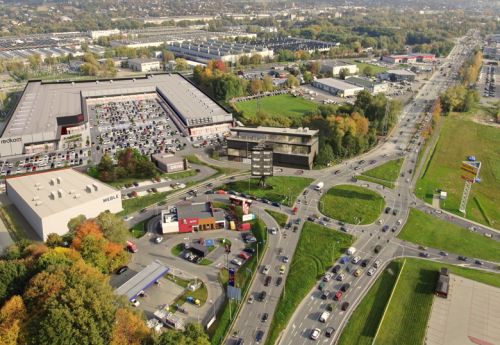The soft sell
New technologies
Katarzyna Suska, ‘Eurobuild CEE’: How much does it cost to set up an online shop?
Roman Baluta, president of the board at Orba: In the case of ‘tailor made’ projects with full design, prototyping and implementation, the minimum cost is PLN 150,000–200,000. However, there is no limit to this – an e-store can be refined endlessly, particularly when it comes to fashion. New collections are introduced, trends and colours change, you need to refresh the graphic layout quite often. You can integrate new delivery forms, new ‘click and collect’ processes, you can make an additional tablet version of the shop just for the staff or a B2B platform for brand distributors located abroad. You cannot treat an investment in an online shop as a single expense. It is the cost of creating the base that you work with. There is of course the possibility of starting with a smaller budget, using a ready layout provided by the Magento platform. Then you do not need the proto-typing process or to create a personalised graphic design from scratch, which reduces the costs and the implementation time. Such projects can be carried out for just several thousand złoty. This is the path to take for companies that do not have the capital to invest in large systems at a particular stage or for companies that want to learn the business from the operations side before they optimise their online shop.
13 pct of online shops across the world are based on Magento. Why is this the most popular system?
Magento is positioned between an implementation tool that costs a few hundred thousand dollars and one that is ready for USD 2,000. As a result, it has gained the dominant position across a broad range of the market. In my opinion the strength of this technology results, on the one hand, from imposing a certain kind of standardisation creating an ‘ecosystem’ of companies that implement Magento: the ordering party does not have to be involved with one provider forever, which is a risk inherent in designer software. On the other, it is a flexible platform, thanks to which our specialists are not limited by technology in implementing innovative functionalities.
In the case of the Recman brand, you are building a system that combines their offline channel with online functioning – omnichannel commerce processes such as ‘click&collect’. What specific aspects need to be taken into consideration when working for online fashion shops?
There are a number of specific fields in the case of fashion. One is the choice of a suitable filtering and product presentation method: its colour, size and pattern. These features need to be arranged in the right way, which could be a complicated process, but it also only has to take into account the collections that are being made. Another important issue in the case of fashion is the efficient processing of the return of goods, both in terms of the customer and the shop’s staff. Personalisation, customers’ opinions and automatically generated recommendations are also significant. Today the key challenge is, however, the integration of the sales and communication channels with customers. Processes such as the collection of goods ordered online in a brick and mortar shop or the option of returning the goods has become the standard – I order three pairs of shoes, only one pair fits and I can take the other back to any shop of the brand or send them back, whichever option is more convenient for me. The sales staff in the brick and mortar shops having the appropriate tools is an equally important aspect – when my size or colour is not available in the shop, I can order it to be delivered to my home or to a shop.
What was the most unique request you have ever had?
I think it was the process of sending goods suggested by an American footwear brand in the premium segment. The process involved sending the goods directly from shops but without a central warehouse and under the assumption that the goods could be located in any shop in the European Union. We had to consider various scenarios, such as when each of the ordered goods is located in stores situated in a different country and the customer is from yet another region. There is also the question: whether to send all the products to one shop, consolidate them or send them independently to the customer? And what should be the approach to the issue of returns and payments? There are additional bookkeeping and financial complications on top of that.
Does e-commerce make the operations of offline stores any easier?
For fashion brands that are making a name for themselves on the market and have not managed to position themselves in the world of fashion yet, e-commerce is a huge opportunity, which can be seen in how such entities as Showroom or Mostrami operate. Online shops make it easier to promote local designers on a large scale. E-commerce does not always make life easier for large and popular brands. The owners of these entities must secure the position they have worked for over many years – and it is not always easy or... profitable. On the other hand, online stores make it easier for large brands to reach customers who do not live in large cities and have no possibility to get to the brick and mortar shops. Another value for large players is the online sales analysis, which is another source of information about customers. This can be combined with the information gained offline to draw up a picture of the potential, actual and long-term customer. In the case of brands that generate the majority of their traditional sales through third parties, the online channel makes it possible to take the direct relationship with customers away from distributors and retail chains that trade their goods in the offline world.
Do you also develop modules for online stores based on Magento, which collects information from the customer experience field?
We use a variety of technological systems aimed at the collation of customer experience information. We often use the systems that are available on the market, e.g. we work with such suppliers as Quarticon and E-store Media, which specialise in recommendations, analyses and marketing automation. More and more data feeding channels will come into being, which will make it possible to create the right level of personalisation. There used to be only the website. Nowadays this involves the website, mobile applications and intelligent tools (IoT). Furthermore, you can pick and choose colours, order accessories not present in the shop or take a photo of yourself and ask for styling on tablets in the changing rooms. A good example of a shop based on the Magento system, which definitely goes beyond standard framework of technology in terms of CX, is Rebecca Minkoff.
Do you also design applications for social media that collect data about customers?
No, we do not. This is beyond the scope of our operations. However, our customers use such tools, so we allow integration with such external data sources, which we can then feed, e.g. into the personalisation system. We start our work from a functional design using a scale model, a drawing, made by UX specialists [Editor’s note: User Experience – the term describes the experience that accompanies customers while using a product or service]. Next we design and implement the graphic layout. Besides this we visit clients and tell them how they should set up the warehouse processes. We go beyond the software.
Founder at the helm
Roman Baluta is a graduate of the Warsaw University of Technology. He has carried out projects for Accenture, PKP Cargo, PWPW, Sony Mobile Poland and InPost. He studied in Paris and gained experience working in the USA. For Orba, which he is the founder of, he carries out key projects and he is responsible for the operations of the company, while being jointly responsible for its development strategy. Orba specialises in producing IT systems for the e-commerce industry.





















































